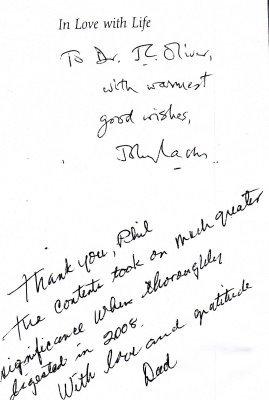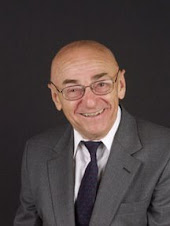 Lachs: “The lesson is clear. Love life so long as there is something worth loving… But at some point, wanting more life runs into the chill reality that the kind of life we can get is no longer worth the cost. This does not mean that we surrender our love of life. As in a broken love affair, we give up the loved one, not the love. With anguish or with quiet resignation, we face the fact that the days of love are gone.”
Lachs: “The lesson is clear. Love life so long as there is something worth loving… But at some point, wanting more life runs into the chill reality that the kind of life we can get is no longer worth the cost. This does not mean that we surrender our love of life. As in a broken love affair, we give up the loved one, not the love. With anguish or with quiet resignation, we face the fact that the days of love are gone.”
Dad: “Well expressed!”
Lachs: “All it takes to overcome tiredness with life is to open open our eyes. The world is throbbing with energy and promise, and if we can view it as kin to us, as our home, as in some sense ours, its movement will forever hold our gaze. The fascination abides even if we are too weak to do much more than see what happens next. We need simply to immerse ourselves in the energy of life all around us, as fish do swimming in the throbbing sea.”
Dad: “great!!”
Great!! indeed. Lachs has opened my eyes, to immediacy and to so much else over the years. He is a quintessential humanist, personifying an infectious love of life while repudiating false solace in overly-simple answers to its persistent, inequitous existential riddles. He embodies, enjoys, and demonstrates the liberty of a free mind and heart for whom work and play converge in philosophy.
He’s the right kind of Stoic, not the sort who ridicules positive thinking, disparages optimism, and counsels a general attitude to life of indifference (see Oliver Burkeman’s The Antidote: Happiness for People Who Can’t Stand Positive Thinking). Lachs knows we don’t have to “chase after enjoyable experiences,” we just have to be ready to catch them when they come.
==
Lachs likes to say that if you can accept constructive criticism you’ll go far. He solicits it himself, with zest and without resentment. He doesn’t particularly need it now, from me; he’s gone far, far beyond mere professional distinction, by any reasonable measure of intellectual, pedagogical, or humanitarian excellence.
But I would like to raise one small point of dissent, with respect to Lachs’s treatment of William James’s concept of “moral holidays”; and another point of general concern, regarding his approach to balancing immediacy and temporality.
Lachs says James recommends against moral holidays, I say he doesn’t. More on that shortly.
And, Lachs says we mustn’t spend much time or energy worrying about the future, on pain of compromising our attention to present satisfactions. I agree that we mustn’t sacrifice immediacy, but I’m concerned that this way of putting the issue invites recklessness on a warming planet and in a fractured democracy.
To begin with with my second point of concern. We should use the past the way we use food, Lachs has said, for the sustenance of life. The same surely applies to our orientation towards the future, whose very possibility depends on our ability and will to live sustainable lives and create conditions enabling our immediate successors to do likewise. But what can it mean to use the future, to sustain life in the present?
One powerful use, suggested by a visionary organization called the Long Now Foundation but implicitly spurned by Lachs, is to use and deploy tangible symbols of our possible commitment to a self-sustaining world to help actuate that commitment as persistent and real.
“The attitude of seeking fulfillment in the future and viewing each present act as means to later joys,” he wrote in Intermediate Man, “tends to destroy the natural satisfaction that attends the exercise of each of our parts.” It’s an attitude, he was saying, that deprives us of immediacy and its intrinsic rewards, and encourages us to fret about things far beyond our control. He was already anticipating his own later stance as a pragmatic stoic, who’s learned the futility of ceaseless effort directed at outcomes we’ll never know or enjoy.
“Once attention is shifted from the future and we begin to enjoy activities at the time we do them and for what they are, we have transcended the mentality that views life as a process of mediation toward distant ends.”
There’s the rub, for me. Of course we owe it to ourselves to enjoy our lives and not let them slip away in dark clouds of distress over all the possibilities for future failure that may cross our worried minds. We owe it to our children to show them how to do that, or at least inspire them to pursue happiness themselves and pay it forward in their own turn. But we also owe it to ourselves and them to dream a little dream of a flourishing future for all our descendants.
We’re ennobled when we keep an eye on the future, and diminished when we don’t. The great challenge of living is to enjoy our lives while not forgetting that they are indeed part of an ongoing process, while not allowing ourselves to transcend the mentality that views life as a chain we’re privileged to link up with, and for which we bear generational responsibility for sustaining and extending to the best of our capacity.
It may sound a bit grim, that focus on perpetual responsibility for the future. It isn’t, if we allow our speculations and dreams about distant ends and the possible futures we’ll never know at first hand to expand our catalog of positive possibility.
And it isn’t, if we give ourselves permission to take regular breaks from the feeling of burdensome responsibility and relax for a little while into pure immediacy. William James called those breaks moral holidays, and (contrary to Lachs’s suggestion) he was all for them. “I fully believe in the legitimacy of taking moral holidays,” James proclaimed, not because the world’s fate is in better hands than ours – Josiah Royce’s Absolute conviction – but precisely because it isn’t.
“I just TAKE my moral holidays,” because pragmatic empiricism does not give them to us in the way of Absolute Idealism. Lachs contends in a footnote (Stoic Pragmatism 99, 8) that James “does not say that the holidays of which he speaks are moral holidays, and he generally shies away from endorsing breaks in our earnest efforts to improve the world.” Does he? I generally read James as wholly and unreservedly endorsing the attitude of his German shopkeeper “who for five or six months of the year spends a good part of every Sunday in the open air, sitting with his family for hours under green trees over coffee or beer and Pumpernickel, and who breaks into Achs andWunderschons all the week as he recalls it.” His “contentment in the fine weather, and the leaves, and the air, and himself as a part of it all” is a springboard of renewal that propels him cheerfully back to work, back, as we say, to “reality.” But he knows that his recreation is at least as real as his work (which would suffer as surely as he would without his springboard).
The visionaries of the Long Now Foundation dream of a day, possibly a day in the year 12,017 or so, when tourists on holiday will journey to a destination that houses an ancient clock. There they will marvel at the foresight and mentality of people who taught themselves, ten thousand years in the past, to transcend a life of pure and exclusive immediacy.
Lachs also favors moral holidays, of course, and cares deeply about the future – especially the immediate future of his students. I would simply invite him to widen his appreciation of the implicit purview of that care in its most expansive natural scope, and enjoy the view from circa 12,017 now, in our present, while it’s still one of our constructively-motivating possibilities. If ten-thousand years feels like an overshoot, consider again that Dennett epigraph above. So many of our long-gone benefactors of millennia past held us in their regard, even as they boggled to imagine the detailed shapes of our lives. They didn’t need the details, but implicitly knew we needed their regard. They knew their present could become our past, our present their future.
Here’s another slant on this issue. I recently returned from Ecotopia, the bicycling mecca of the great American northwest,, mythic Portlandia, aka Portland, Oregon. The city played genial host for this year’s Society for the Advancement of American Philosophy (SAAP) conference. Being there was wonderful, a much-anticipated moment of professional engagement and personal renewal that was on most counts sufficient unto the day. Of course it evoked many previous occasions of the same sort, and ended in explicit anticipation of the next such gathering a year hence.
But therein lies a more exposed portion of the partially-occluded philosophical knot we’re tugging here. Being in the moment, and being happy to be there, is much of what Lachs means by immediacy. Waiting for a moment, anticipating it, wishing and longing for it, may pull us away from countless potential moments of immediacy nearer to hand. It may also warm a cold winter’s night, though, and bring a different kind of immediacy – the immediacy of expectation and hope.
This question of how to balance a quest for personal immediacy with a sense of responsibility to the future has long teased and tormented philosophers. I don’t think it’s detracted at all from my own enjoyment of the present, which for a professional academic necessarily involves this form of tease and torment. Rather, it has linked many presents and brought many futures closer. It’s been one of the streams I fish in, a tributary of the great Transcendentalist river Thoreau and Emerson paddled.
Deadlines are arbitrary, in the larger scheme. But for us practiced procrastinators who love “later” too much, they’re indispensable. They’re the point of temporal convergence when there must be a reckoning, when we must toe the line.
Henry knew. “In any weather, at any hour of the day or night, I have been anxious to improve the nick of time, and notch it on my stick too; to stand on the meeting of two eternities, the past and future, which is precisely the present moment; to toe that line.”
Did he meet all his deadlines? No. Who does? “I love deadlines,” said Douglas Adams. “I love the whooshing noise they make as they go by.” But we’ll all meet the last one, too many (like Adams) much too soon. That ought to put a little more resolution in a procrastinator’s step and keep him moving, not to toe the line but to extend it and finally transcend it.
If every day is Doomsday, as Emerson said one day, then every moment is a deadline. “One of the illusions of life is that the present hour is not the critical, decisive hour.”
We can’t really be thinking that every moment, we’d die too soon of stress and worry. But there are days, deadline days, when it’s a good thought to hold in mind. “Write it on your heart that every day is the best day of the year,” and get on with it.
Isn’t the future an inscrutable abstraction? Well, futurity may be. But living and breathing future humans are concrete possibilities, dependent largely on us until doomsday dooms us all. My mentor Lachs has always understood that, acting with tireless solicitude for the students he’s tacitly but unmistakably treated as tangible emissaries of the future, visiting us here in what will become (barring that rumored imminent doomsday) their past.
Balancing immediacy and futurity would then seem to be a matter of sensing where we are, in the present, with regard to past and future. John McPhee’s Bill Bradley had that sense on the basketball court for Princeton, as chronicled by John McPhee in A Sense of Where You Are(1965) and revisited by Dreyfus and Kelly in All Things Shining (2011). It’s a special quality of attention to what’s going on right now, that sets up smart choices going forward. Shoot, pass, or dribble? Doing the right thing next depends on how well we attend to what’s happening now. Immediacy with a shot-clock: great metaphor! And what great inspiration for writers and scholars, to grasp the ultimate payoff of so many separate moments strung together:
McPhee has published more than 25 books, even though he rarely writes more than 500 words a day. He once tried tying himself to a chair to force himself to write more, but it didn’t work. He said, “People say to me, ‘Oh, you’re so prolific.’ God, it doesn’t feel like it — nothing like it. But, you know, you put an ounce in a bucket each day, you get a quart.”
And that’s how the present appropriates the future, a moment at a time, a day at a time, a sentence at a time. It’s not one or the other, now or then, present or future, but all in due course. Next follows next. John Dewey rightly said we must live in our own time, “extracting the full meaning of each present experience” in preparation for the future. But he also concluded A Common Faith with a stirring recognition that we’re all linked to the “continuous human community,” inseparably tied to its future and bound by our stake in civilization to bear a responsibility for those who will live after us.
Samuel Scheffler calls this the “collective afterlife” of humanity on earth, and in Death and the Afterlife makes explicit what Dewey hinted at, that our investment in the future matters more to us than we typically know.
We should not be so preoccupied with the future that we neglect present joys and satisfactions, but neither should we be so fixated on those that we fail to notice how greatly those joys and satisfactions wordlessly presuppose life’s continuation long after we’re gone. Scheffler’s Doomsday Scenario thought experiment makes clear just how hollow and imperiled our immediate present would be, were we to learn that our species literally lacked a future.
Short of Doomsday, it would be too easy at this odd moment in the civic life of our democracy, to surrender to despair over the prospects of our species and the democratic experiment. But surely that’s precisely why we need to cultivate both immediacy and the long view.
Let’s try one more slant on immediacy. In Spring, when I was a young man, my fancy turned always to the crack of the bat and the thrill of the grass. Still does, and did again recently with Spring Training beaming on the radio from places like Fort Myers FL and Surprise AZ, and sunshine beaming brightly in my own backyard in the middle of Spring Break.
It’s always made me feel like a kid again, with nothing in the moment more urgent than the next pitch, hit, out, batter, inning. If my team didn’t win it was a shame, but there was always hope for tomorrow’s next game, and eventually for next year. Sometimes “we” won, sometimes lost, sometimes it rained, but the unfiltered immediacy of the sounds and conjured images crackling through those “50,000 red-hot watts” was hot indeed. It was almost better than being there.
Yearning to recapture the vital immediacy of that childlike devotion, I keep tuning in every Spring. It’s so much easier, now that all the teams’ radio broadcasts (not just the “home teams’) are readily available via the internet. So are most of the telecasts, but I’m not interested in crowding the game into a small screen. In my imagination it’s so much better, so much bigger than life. Immediacy is also like that, so much enhanced by the power of personal imagination.
The kind of philosophical writing Lachs says (in “The Personal Value and Social Usefulness of Philosophy”) he’s always aspired to, “with the beauty and inventiveness of Mozart’s music,” is similarly enhanced by the imagination’s quest to trap the immediacy of our best moments and days.
“It is necessary to write,” wrote Vita Sackville-West, “if the days are not to slip emptily by. How else, indeed, to clap the net over the butterfly of the moment?” It’s a bracing thought, which itself threatens constantly to flit away. Sometimes there are just too many butterflies to track.
Tracking butterflies is another lovely metaphorical way of thinking about immediacy, though “tracking” may imply more deliberation and conscious intention than is desired. Less spontaneity and receptivity. The best experiences of immediacy seem just to happen, unsought, unsolicited, unexpected but very welcome. They flow. Or flit on the wind. No one, no thing, no visible chain of interference or interpretation interposes between you and the object(s) of your experience, when your net is working.
Writing is a highly directed and intentional activity, but it is possible occasionally to fall into a rhythm of words that seems to flit and flow without excess effort or angst. When that happens, writing is itself another fly for the net.
I don’t mean that genre of involuted, tortured, self-conscious, overly self-involved post-modern hand-wringing that some indulgent writers perpetrate. I don’t mean writing about writing at all, necessarily. I do mean writing that recognizes its own intrinsic value, undertaken both for its own sake and for the sake of noticing and attending to the world beyond pencil and keyboard.
The aforementioned All Things Shining includes an interesting discussion of blogging as a species of writing that can feel direct and immediate and attentive, but become something else – something derivative and dull. I’m pondering that. It was in the butterfly spirit that I began posting my daily dawn reflections several years ago, to capture more moments. How many butterflies get away, for every one snared? How many must you snare, to gain immediacy and claim attentive success? If one day in a hundred that would have slipped by gets caught, isn’t that good?
Lachs agrees, I think, that for animals like ourselves it may just be good enough. The point is not to capture all the butterflies, all the moments, an unreasonable aspiration for finite and imperfect creatures, but to capture those we can and in the process make vital connection with others of our kind. In a season of recurrent political bluster and the repeated threat of self-imposed isolation, we must insist on building not walls but bridges.
And, we must insist on accepting and enjoying, but possibly never finally “solving,” the puzzle of our complex relationship with time. Older Daughter neatly punctuates the point when she reminds me of what the Panda said: “the past is history, the future’s a mystery, today’s a gift. That why it’s called the present.”
Albert Camus’s rebel was not wrong to say that “real generosity towards the future lies in giving all to the present,” so long as we understand that present-mindedness only becomes generous when their present matters to us too.
Our goals must not be cosmic, Lachs has said [SP 33]. Perhaps not, but our sensibility and our intelligence had better be. “Our future depends powerfully,” said Carl Sagan, “on how well we understand this cosmos in which we float like a mote of dust in the morning sky…”
==
Lachs’s stoic/pragmatic commitment to immediacy, it should be noted, is resonant with the kind of altruism and empathy we get from Buddhist Matthieu Ricard. In his 2004 “Habits of Happinss” TED Talk RIcard says some of us believe only in “remembering the past, imagining the future, never the present.” I don’t know anyone who really says that, but many of us act as though we believe it most of the time. That was also Kierkegaard’s point, when he complained of the mania of busy-ness. We don’t stop to smell the roses often enough, forget the clock and the to-do list (Lachs’s “rat-race”) and just inhabit the moment attentively.
But that’s not to say that happiness is exclusive to right now, the present moment that’s here and gone in a wink. Ricard quotes Henri Bergson, “All the great thinkers of humanity have left happiness vague so that each of them could define their own terms.” Smart. When I find a way to articulate precisely what’s wrong with a pure presence that forgets past and future, I’ll finally have defined happiness my way and identified my happiness project. There is no single Project, Lachs knows, just so many projects mirroring so many human natures. Most of them have been allowed to gather dust.
The best projects integrate a capacity for attentive presence, a reminiscent fondness for the past of pleasant memory, and an active interest in what William James called our most vital question. “What is this world going to be? What is life eventually to make of itself?” Happy people delight in imagining the future, caring about it, building it – or at least not impeding or derailing it – in the present. They always have.
Phil Oliver

 Baseball/Lit/Culture
Baseball/Lit/Culture 







 Charles Darwin (
Charles Darwin (










